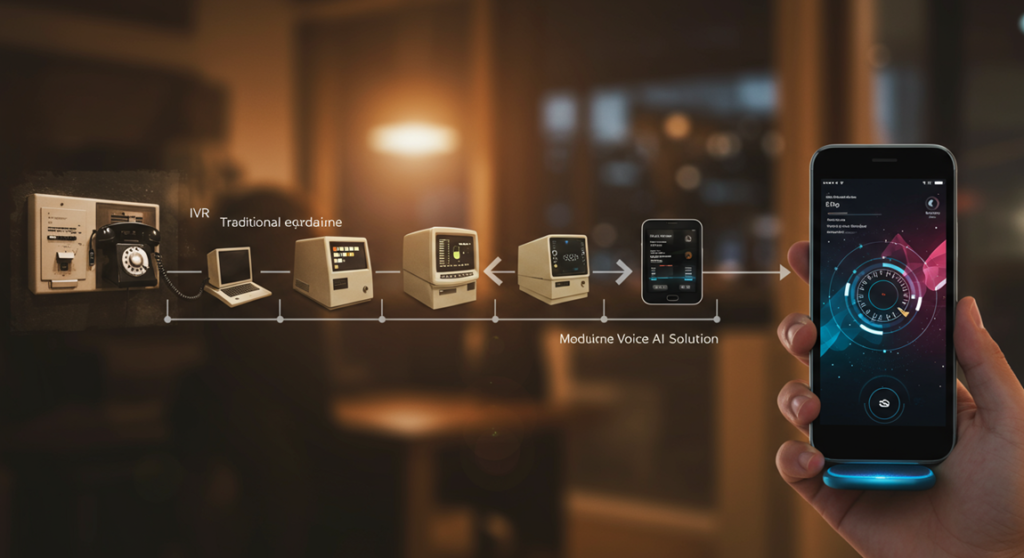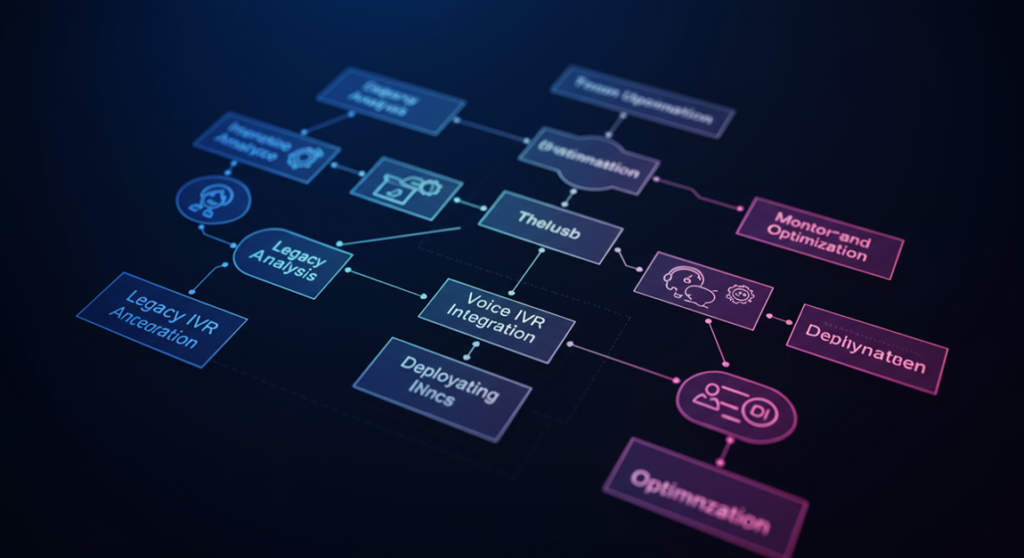The Evolution of Customer Interaction
Over the years, customer interaction has experienced significant shifts, particularly with the transition from legacy IVR systems to sophisticated Voice AI technologies. Understanding this evolution can help businesses better prepare for the future of customer service.
Brief history of IVR systems and their limitations
Interactive Voice Response (IVR) systems were established in the 1970s to facilitate automated responses in call centers. While these systems offered a structured way to handle customer inquiries, they often fell short of user expectations. The rigid menu-driven interface frequently led to customer frustration, particularly when users struggled to find the appropriate options or had needs that exceeded the capabilities of the IVR programming. This limitation highlighted the need for a more adaptable customer interaction solution.
The rise of Voice AI and its transformative potential
With advancements in AI technology and natural language processing, the introduction of Voice AI systems has profoundly changed how customers engage with businesses. Unlike traditional IVR, Voice AI provides conversational interfaces that allow for more dynamic interactions. Customers can express their needs in natural language, and the AI can accurately interpret and respond to inquiries, creating a more personalized customer experience.
Highlight Voicera’s role in driving this transformation
Voicera VLM stands at the forefront of this evolution, offering innovative AI and cloud solutions designed specifically to address the limitations of traditional customer service systems. By integrating AI avatars and virtual sales agents, Voicera empowers businesses to improve customer interactions and optimize operations. This strategic approach not only helps meet customer demands but also drives growth within organizations eager to embrace modern communication methods.

The Evolution of Customer Interaction
Legacy IVR Systems: Challenges and Inefficiencies
As businesses seek to improve their customer interactions, traditional IVR systems often fall short, posing significant challenges. The limitations of these legacy systems can have a lasting impact on both customer experience and operational productivity.
Limitations of Traditional IVR Systems
Legacy IVR systems tend to feature complex menus that can frustrate customers. Navigating through multiple layers of options can lead to confusion, resulting in high abandonment rates as customers opt to hang up rather than continue their quest for the needed information. Furthermore, these systems often provide impersonal interactions, making it difficult for customers to feel connected to the service they are receiving.
Impact on Customer Experience and Business Efficiency
The challenges faced by legacy IVR systems negatively affect customer satisfaction. Customers who experience difficulty in reaching an appropriate response may develop a frustrating perception of the business. This disappointment can result in lost sales opportunities and a reduced willingness to engage further, ultimately diminishing the brand’s reputation.
Costs Associated with Maintaining Legacy IVR Infrastructure
Maintaining legacy IVR systems can lead to significant financial burdens. The costs incurred from required updates, ongoing maintenance, and the need for trained personnel contribute to an inefficient use of resources. These expenses can strain budgets, making it imperative for businesses to evaluate whether continuing with legacy systems is a viable long-term strategy.

IVR challenges and inefficiencies
Voice AI: Revolutionizing Customer Interactions
The advent of Voice AI technology is significantly changing how businesses engage with their customers. With features like personalized responses, round-the-clock availability, and easy interactions, Voice AI is redefining customer experience and support.
How Voice AI Improves Customer Experience
Voice AI enhances customer interactions by ensuring that responses are tailored to individual needs, which fosters a sense of connection. The technology allows for 24/7 access to support, meaning customers can receive instant assistance regardless of the time of day. Additionally, the conversational nature of Voice AI promotes smoother interactions, where queries can be resolved promptly and without hassle.
Benefits of Voice AI for Businesses
For organizations, the adoption of Voice AI leads to increased operational capacity and reduced costs. By automating response systems, companies can reallocate resources to focus on more complex issues. Furthermore, the data analytics capabilities of Voice AI provide valuable insights into customer behavior and preferences, ensuring businesses can make informed decisions and optimize strategies accordingly.
Voicera’s Innovative Voice AI Solutions
Voicera VLM is at the forefront of this technological shift with its comprehensive Voice AI solutions. Our VLM platform are designed to create notable improvements in customer service through advanced voice recognition and AI integration. With Voicera, businesses can expect not only traditional call center solutions but also advanced AI-driven systems that enhance the overall customer journey.

Voice AI Customer Interactions
Strategies for a Smooth Transition to Voice AI
Transitioning from legacy IVR systems to Voice AI can be a significant move for businesses seeking to improve customer interactions. By understanding the process and employing strategic planning, organizations can facilitate a successful migration that optimizes both customer experience and operational capabilities.
Step-by-Step Guide for Migrating from Legacy IVR to Voice AI
Begin your migration by assessing your current IVR system and identifying the functionalities that need replacing or improving. Next, conduct an analysis of your customer interactions—determine common inquiries, pain points, and the desired outcomes your customers seek. From here, select the appropriate Voice AI technology that aligns with these insights and create a migration plan that includes steps for implementation, testing, and feedback collection.
Integration Strategies and Considerations for Various Business Needs
When integrating Voice AI into your existing infrastructure, consider the specific needs of your business. Ensure your AI-driven systems can communicate with other tools and platforms you use, such as CRM or analytics services. Additionally, prioritize scalability to accommodate future growth, allowing for adjustments as your customer interaction demands evolve.
Importance of Ongoing Optimization and Training
Once your Voice AI system is live, the focus should shift to monitor and optimize. Regularly analyze performance metrics to identify areas for improvement, and invest in the ongoing education of your AI to adapt to changing customer language and preferences.
Conclusion: Embracing the Future of Customer Engagement
As businesses increasingly recognize the transformative potential of Voice AI over legacy IVR systems, the advantages become clear. Voice AI technology offers a more intuitive and user-friendly experience, delivering accurate and personalized responses, which significantly uplifts customer satisfaction. Unlike traditional IVR that often leads to frustration, Voice AI engages customers in natural conversations, making interactions smoother and more efficient.
Voicera’s Commitment to AI-Driven Customer Interactions
At Voicera, we are dedicated to supporting businesses as they transition to advanced customer engagement strategies. Our AI-driven systems are designed to not only meet but exceed the changing demands of consumers. Our solutions, including AI avatars and virtual sales agents, embody our commitment to improving the overall customer experience while driving sustainable growth.
Explore Voicera VLM
Are you ready to explore how Voice AI can reshape your customer interactions? We encourage you to discover Voicera’s VLM tailored to meet your organization’s unique needs. Scheduling a demo is the first step toward embracing the most effective communication strategies in your operations.

Voice AI Platform by Voicera







The future of AI autonomy is here-Manus AI impresses with its self-driven task execution. For a similar experience, check out DeerFlow AI Agent.
Great breakdown! The synergy between MCP Server and AI tools like MCP A2A shows how MCP is reshaping LLM integration and real-time data interaction. Exciting times for developers!